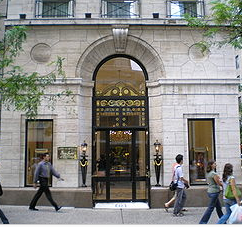Articles and News
DIAMOND PRICES, EURO CRISIS TO AFFECT HARRY WINSTON FORWARD SALES DESPITE STRONG CURRENT REVENUES October 12, 2011 (0 comments)

New York—Harry Winston, the uber-luxe diamond company best known for its red carpet presence, is proof that no man—or diamond—is an island.
While the company posted strong growth in jewelry and watch sales in major markets, it told investors this week that declining diamond values and the European debt crisis are likely to affect its revenues in the fourth quarter.
According to this article in LuxuryDaily.com, the firm is seeing strong sales in the U.S. and Japan, and growth in China. Its watches are strong sellers, along with its bridal and high jewelry lines. The firm attributes the growth to heavy advertising in publications such as The New York Times and various bridal magazines for those collections.
But prices for polished round diamonds, which make up the core of the firm’s bridal collections, have dropped about 10% in the last two months, says the article. Indeed, high diamond prices slowed sales at the recent Hong Kong jewelry show, as reported by The Centurion in its September 29 edition.
The European debt crisis plays a role because much of the diamond polishing industry—especially in Europe and the United States—relies on funding from European banks, which are tightening their lending in light of the crisis.
Jeff Pfeffer, a senior vice president of CapitalOne Bank who previously spent many years in the diamond banking industry, says banks aren’t singling out the diamond industry per se, but they’re tightening up lending in general—and two of the three main European diamond-lending banks were cutting back even before the debt crisis came about. Dutch-owned ABN-AMRO has been bought and sold several times since 2007 so they’ve been very strict about lending. ADB, meanwhile, is part of the Belgian bank KBC, which has scaled back lending to the diamond industry because it’s not one of their main strategic businesses. Standard Chartered remains a large lender to the industry globally, and while there are Indian and Israeli banks also committed to the sector, they tend to lend mainly within their own countries.
“The stronger diamond companies will survive. The weaker ones that can’t get credit will fold or be acquired,” he told The Centurion.
What does it mean for an American independent jeweler? Like everything else, what happens at the top flows downstream, so if diamond companies can’t extend as much credit to manufacturers, they in turn can’t extend as much credit to retailers. So the buyer with the cash in hand is going to get the best goods.







